
PhD Research
- PhD trajectory
- Courses for PhD candidates
- PhD projects
- PhD Council
Becoming a PhD student at Amsterdam Business School?
The Amsterdam Business School aims to conduct and high-quality international research and offers teaching that meets international standards at a high-level. We regularly offer PhD positions for outstanding candidates who want to pursue an academic career in the inspiring and challenging academic environment of our school and who are willing to contribute to its lively community. Currently about 60 PhD candidates are working on their PhD research at Amsterdam Business School, running the gamut of business and management disciplines.
At the University of Amsterdam Business School there are two main ways to start a PhD trajectory: through the Tinbergen Institute and on a vacant project. Furthermore, we sometimes accept open applications. Most PhD students are employed by faculty as PhD researcher in a full-time position with all the benefits of employment, including a good salary. The entry into such a position is either through one of the research master programmes of the Tinbergen Institute (see below) or directly in an open vacancy. Another route is by submitting a research proposal either as a student on a scholarship (such as the China Scholarship Council Programme) or e.g. with employer funding for those working in a R&D department in another organisation.
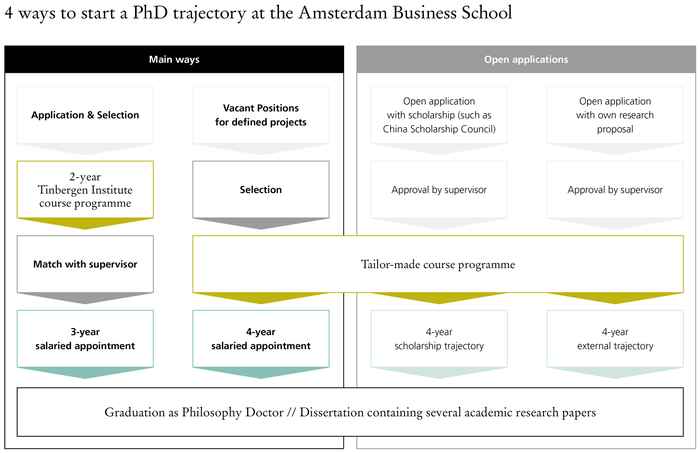
The Amsterdam-Rotterdam Consortium for Graduate Education (ARC), a joint initiative by t he University of Amsterdam (UvA), Erasmus University Rotterdam (EUR) and Vrije Universiteit Amsterdam (VU) provides 2 important PhD programmes that prepare for a research trajectory at Amsterdam Business School.
- An intensive 2-year research master in Economics, Econometrics and Finance. Students who pursue a PhD in finance are selected from this research master at the Tinbergen Institute.
- The research master in Business Data Science has a strong focus on data science related to multiple business fields. Students who pursue a PhD in e.g. Operations Management are selected from this research master.
Both Master's programmes prepare students for a subsequent 3-year PhD trajectory with a state of the art course programme with rigorous training in the core subjects and tools of economics, econometrics and finance in the first year and specialisation in one of the many fields of research through field course work and the research master thesis in the second year. At the end of the programme, students are matched with a supervisor based on their research interests. Students who are assigned a supervisor from ABS have the opportunity to start the PhD trajectory at our school.
- Read more about the Research Master in Economics, Econometrics and Finance
- Read more about the Research Master in Business Data Science
Most PhD positions will be published on the vacancy website of the UvA. Requirements, which vary by position, will be published in each vacancy. The educational programme for these PhD candidates at our school consists of an individualised course trajectory that each PhD candidate shapes, in consultation with his or her supervisor and the Research Institute director. This approach enables education tailored to the needs of each individual candidate and project. This model is in place as we have PhD candidates from very different backgrounds in different research sections as well as many different research topics, ranging from leadership and accounting to marketing and entrepreneurship, and the methods and disciplines they need to be trained in are too different to combine in one single programme. Many interesting and excellent course options are available for PhD candidates and since the programme is highly individualised, even very specific courses as well as summer schools from other top-institutions, even those abroad, can be selected.
- Read more about our vacant positions
- Read more about our tailor-made educational programme
Candidates who wish to pursue a PhD on a specific topic (usually related to their work environment) and who are financially self-supporting (e.g. with company funding or a formal external scholarship) can apply for an external PhD trajectory. The first step is to match the candidate and proposal with a supervisor at Amsterdam Business School in the relevant field. If a supervisor has been found, a similar trajectory as for those on a vacant position is followed and a tailor-made educational programme will be compiled.
- Learn more about our PhD trajectory for external PhD candidates
- Read more about the tailor-made educational programme
- Find vacancies for PhD candidates in the overview of UvA vacancies
Cookie Consent
The UvA uses cookies to ensure the basic functionality of the site and for statistical and optimisation purposes. Cookies are also placed to display third-party content and for marketing purposes. Click 'Accept all cookies' to consent to the placement of all cookies, or choose 'Decline' to only accept functional and analytical cookies. Also read the UvA Privacy statement .
PhD research
How to become a phd student.
The main route to becoming a PhD student at the Amsterdam School of Economics is to follow the intensive 2-year Research Master's programme at the Tinbergen Institute (TI). The aim of this excellent Master's programme in economics, econometrics and finance is to prepare students for further academic research. In the 2 nd year of the Research Master's programme, students are usually assigned a supervisor, based on their research interests. Students who are assigned a supervisor from ASE have the opportunity to apply for a PhD position at our School.
For fields not covered by the TI, and for specific projects, vacancy announcements are posted on the website of the University of Amsterdam.
Candidates who are financially self-supporting (usually those who wish to pursue a PhD next to an appointment in a company or elsewhere) can apply for an external PhD. The conditions are stated in below document 'External PhD students ASE'.
Tinbergen Institute
Tinbergen Institute (TI) is one of Europe's top graduate schools and research institutes in economics, econometrics and finance. The institute uniquely combines the best of 3 leading universities in the Netherlands: the University of Amsterdam (UvA), VU University Amsterdam and Erasmus University Rotterdam (EUR). TI offers a Research Master's programme in Economics (with 3 tracks: Economics, Econometrics and Finance) as well as PhD opportunities under expert supervision by our international research fellows. With 30 nationalities in the institute and 70% of our students coming from abroad, Tinbergen Institute provides a truly international experience. The 3 universities also work together in the joint Research Master's Business Data Science .
PhD Council
At the beginning of 2021, the UvA Economics and Business PhD council was started. It represents the interests of all PhD candidates at the Faculty of Economics and Business, from both the Amsterdam School of Economics and the Amsterdam Business School. Aim of the council is to be a sounding board for organisational developments within the faculty that concern PhD candidates. In addition to this, they want to stimulate interaction and communication between PhD students at different sections and departments.
Cookie Consent
The UvA uses cookies to ensure the basic functionality of the site and for statistical and optimisation purposes. Cookies are also placed to display third-party content and for marketing purposes. Click 'Accept all cookies' to consent to the placement of all cookies, or choose 'Decline' to only accept functional and analytical cookies. Also read the UvA Privacy statement .
Application and Admission
Amsterdam Institute for Social Science Research / AISSR
Application procedure
Check out the available PhD positions at the UvA vacancy portal.
Private funding
If you submit your own research proposal you should be aware of the following:
- Which topic would you like to explore?
- Which programme group would you like to join?
- Which supervisor do you have in mind?
- What funding is obtained to cover the associated fees?
- How does your time plan roughly look like?
If a PhD project is financed by the University of Amsterdam or through a grant awarded to the University by a third party, the PhD degree is conferred by the University of Amsterdam.
Fees for scholarship and external PhD candidates
PhD candidates who are not employed by the University of Amsterdam but receive a scholarship, pay a fee of €4.545 up to €15.000 annually (depending on the specific situation). This fee covers a variety of costs such as the selection procedure, supervision, PhD training (core courses, seminars) and a small research budget.
Self-funded external PhDs can ask for a tuition fee waiver, but still need to bring their own budget to cover costs of living (see explanation below).
Scholarship PhDs
If you have obtained a scholarship to pursue your PhD, please provide additional information about the conditions.
External PhDs
What funding is obtained to cover the monthly allowance for the duration of the PhD trajectory (in general 4 years, full-time)? When you will be residing in Amsterdam this minimum monthly allowance is rated at €1,717.
Scholarship and self-funded external PhDs will need a research budget of at least €9,000 for the whole PhD trajectory.
For the complete information regarding external PhD’s, please check out the PhD Admission Manual.
Admission criteria
The minimum requirements for all PhD candidates are:
- Master’s degree, or academic degree that is equivalent to Dutch final university examination
English language proficiency test
(one of listed)
- TOEFL Internet-based test (minimum total score 100, minimum score on each component: 22) Paper-based test (minimum total score 600, minimum score on each component: 57)
- IELTS (minimum total score: 7.0, minimum score on each component: 6.5)
- CAE and CPE (minimum score: C)
Cookie Consent
The UvA uses cookies to ensure the basic functionality of the site and for statistical and optimisation purposes. Cookies are also placed to display third-party content and for marketing purposes. Click 'Accept all cookies' to consent to the placement of all cookies, or choose 'Decline' to only accept functional and analytical cookies. Also read the UvA Privacy statement .
PhD at the School of Business & Economics
Most of the PhD candidates, internally or externally paid, are employed by the school. Only the part time- and scholarship PhD candidates are not employed.
Our mission is to attract highly motivated, talented PhD candidates to further cultivate their talents through extensive supervision, by welcoming them in an international, open and inspiring environment where knowledge exchange and research cooperation are highly stimulated, and by providing a safe, informal and friendly atmosphere. Your supervisor will help you draw up a training and guidance plan at the start of the project, and guide you in planning your research dissemination activities and seminars at international conferences and at other academic institutions.
Being a member of SBE gives you the opportunity to:
- receive high level course work with leading international scholars at the Tinbergen Institute , Amsterdam Business Research Institute , and/or Business Data Science ;
- be involved in research and social activities, like seminars, workshops, social gatherings;
- be introduced in numerous networks, in and outside the Netherlands;
- have a research budget (for conferences, research visits and /or other research costs);
- gain experience in teaching.
Research at SBE
In recent decades, inequality in the world has been increasing. Governance for Society looks at the underlying causes of inequality and how they relate to differences between regions, between urban and rural areas, and between educational levels. For example, Professor of Policy Evaluation Bas van der Klaauw focuses his research on economic inequality. What makes someone successful? And to what extent does education play a role in this?
Accept all social media cookies to view this content
Training programme
The PhD candidates of the School of Business and Economics receive training at three graduate schools. The PhD candidates in economics, econometrics or finance receive training at the Tinbergen Institute, and the PhD candidates in Business Administration and Operations Research receive training at the Amsterdam Business Research Institute. Furthermore, all the PhD candidates can take courses at Business Data Science
- Tinbergen Institute (TI)
- Amsterdam Business Research Institute (ABRI)
- Business Data Science (BDS)
PhD trajectory in Economics, Econometrics or Finance
If you are interested in a PhD trajectory in Economics, Econometrics or Finance, you have the following possibilities at the SBE:
Research Master + PhD programme (2+4 years): Economics, Econometrics or Finance
Candidates who are interested in a PhD in Economics, Econometrics or Finance can apply for the Research Master at the Tinbergen Institute .
The Tinbergen Institute offers a graduate programme consisting of two years of intensive graduate coursework in the institute's Research Master programme (Mres) and four years of PhD thesis research. The Research Master programme in economics, econometrics, and finance, is an excellent preparation for PhD thesis research in these fields. The Mres programme is taught by the best researchers of the three economics departments participating in the institute (Vrije Universiteit Amsterdam, University of Amsterdam and Erasmus University Rotterdam), and by internationally renowned guest lecturers. Students are carefully selected from a large international pool of applicants. Each year at most 30 students are admitted and thorough selection is part of the admission procedure. The Mres programme has been accredited by the Dutch and Flemish Accreditation Organisation for higher education (NVAO) and leads to a Master of Science in Economics degree. PhD programme The PhD programme takes four years and leads to a PhD degree. These four years are primarily spent on writing research papers for the PhD thesis and on participation in international conferences, workshops, and seminars. Currently, about 120 students are enrolled in our graduate programme. Roughly half of all students come from abroad; students have come from Europe, Asia, North-America, South-America, and Africa. More information For more information and application procedures see www.tinbergen.nl
4 year PhD programme on an externally funded project: Externally funded PhD positions
In addition to the annually PhD positions in Economics, Econometrics, Finance, and Business Administration, there are throughout the year specific project based PhD positions advertised separately on the vacancy pages. For current PhD-job-openings please check vacancies .
Part time PhD programme: Part-time PhD in Economics
Candidates who wish to write a dissertation on a part-time basis are facilitated through supervision, access to the library and research seminars organized by the School. In some cases office space is provided as well.
Applicants are advised to write a short research proposal which fits in one of the research programmes of the School (for more information on our research see the research portal and the departments ) and send this, together with a cv and motivation letter, to the potential supervisor. This is possible throughout the year. There is no application deadline.
If the potential supervisor is interested in supervising the research project, the proposal will be elaborated. When the research proposal is finished, the candidate can start her or his research. The candidate will receive a ‘VU-NET-ID’ which will give access to the library and an email-address. If needed a tailor made plan for education (up to 30ECTS) will be made in consultation with the supervisor and the Director of the Graduate School. The part time PhD student is required to pay a fee of €7,500 euro for the entire period. The fee will be used by the School to pay the courses at the Tinbergen Institute , the Amsterdam Business Research Institute , Business Data Science and or other graduate schools.
Part time PhD students will not receive a salary or scholarship, and thus must be financially independent. Only candidates with a university master degree are eligible for this programme.
For questions, please contact Ina Putter ( [email protected] ). For information about the dedicated part-time PhD programme in Business and Management, please click here
PhD trajectory in Business Administration
If you are interested in a PhD trajectory in Business Administration, you have the following possibilities at the SBE:
4 year PhD programme on an Internally funded project: Annually open competition PhD positions
The ABRI PhD Program in Business and Management will provide you with a wealth of opportunities to engage in impactful research that will advance our understanding of business and society.
The ABRI PhD Program in Business and Management is a challenging program that will help you leverage your talent for doing research. Our program, along with the mentorship of a dedicated supervisory team, will support your development into a leading scholar, teacher, and influential thinker in international business and management research. During the 4-year rigorous training trajectory, you will acquire the academic foundations of business and management research, learn theoretical knowledge and methodological skills for conducting independent research in your field of choice, and develop 3+ academic papers that will form the body of your PhD dissertation. Through this PhD program in Business and Management we support you in:
- Learning to conduct high quality research
- Publishing research in international peer-reviewed scientific journals
- Becoming a valuable member of, and a contributor to a vibrant academic community
The PhD program in Business and Management at a glance:
- Start date: September
- Application opens in October, deadline is early January
- Duration: 4 years
- The PhD in Business and Management is a full-time program
- Most courses and training activities will take place at the campus of Vrije Universiteit Amsterdam (during Covid also online)
- Fully-funded PhD positions (including a generous salary and financial support for conferences, international research visits, data collection and other research expenses) are available on a competitive basis
View all admission requirements, costs & practical information
Part time PhD programme: Part-time PhD in Business and Management
The Amsterdam Business Research Institute ( ABRI ) offers a part-time PhD programme for management practitioners. This programme supports executives and management professionals with a relevant background in conducting PhD-level research, and facilitates them in matching their professional experience with excellent academic insights.
ABRI’s part-time PhD programme offers a conveniently structured trajectory, intensive academic and mentoring support, access to VU Amsterdam facilities, a great research community, a professional and innovative environment and an extensive array of enrichment activities. For more information and application details, please visit the programme’s webpage .
With the part-time PhD programme, ABRI aims to support business leaders in:
- Leveraging their expertise for the creation of innovative business concepts
- Leveraging existing research findings into a new integrated knowledge
- Publishing their work in international business and scientific journals
- Becoming part of a stimulating academic community
What makes ABRI’s part-time PhD programme a great choice?
- Teaching and supervision by internationally renowned professors
- Research support from VU research centres specialising in different business topics (e.g., servant leadership and professional services)
- A unique programme design, focused on a sequential development of academic research papers
- Intellectually stimulating research community
- Excellent location and facilities
- A module-based programme enabling participation of highly-mobile and international participants
Unique characteristics of the programme
- Each programme year follows a cycle of research paper development
- The learning process is deliberately divided into the six sequential modules
- Attainable milestones are set to allow working professionals to stay on track
- The focus on developing academic writing skills enables participants to publish their research work in international peer-reviewed journals
PhD policy and facilities
Hora Finita
Hora Finita is the PhD tracking system of VU Amsterdam. All processes related to the PhD trajectory, from the admission to the trajectory to the submission of the dissertation, run through this system. PhD candidates are registered in Hora Finita within the 3 months (external PhD candidates within the first year and at minimum 2 years before the completion of the dissertation) by the research policy officer. PhD candidates and their supervisors have access to Hora Finita with their vunet-id.
Training and Supervision Plan
To be formally admitted to a PhD trajectory at the VU, the PhD candidate and supervisors fill out the Training and Supervision Plan ( TSP ). This TSP should be created within the first three months of a project, except for the PhD candidates of the ABRI Part-time PhD program in Business who will fill out the TSP after the 1 st year when the supervisory team is appointed. When the TSP is completed, it will be sent to the PhD candidate advisor for approval. When the plan is approved, the plan will be uploaded in Hora Finita. A PhD candidate cannot be formally admitted to a PhD trajectory without an approved TSP and a PhD cannot be completed without a fulfilled TSP. The TSP consists of the following items:
1 Research Proposal and work plan
Every PhD candidate works with a feasible research proposal as of the start of the PhD (3-year trajectories) or within the 1st year (other trajectories), including a realistic work plan. It should be updated over time to make sure that at each moment a candidate has a feasible plan to complete within a mutually agreed time-frame.
PhD students who are employed at SBE have a teaching obligation because it is important for their (academic) career to gain teaching experience. Regular PhD candidates have a teaching load between 0.1 and 0.2 fte. Departments have flexibility to spread teaching load across candidates and across periods. Supervisors and department heads need to ensure that PhD candidates do not teach more than expected.
SBE has set up a teaching skills course, the so-called mini-BKO, for the internal PhD candidates, to give them the skills to teach and supervise theses. External and Scholarship PhD candidates do not teach and are therefore not invited to take the course. This teaching course consists of 3 modules: Module 1 (basic teaching skills) takes place in September, Module 2 (advanced teaching skills) takes place in January and Module 3 (thesis supervision) takes place in March / April. Once a PhD has completed all modules, he / she will receive 4 ECTS.
All PhD candidates at the VU need to receive training at PhD level of a total size of at least 30 ECTS. PhD candidates who have completed a research master's degree in a relevant direction are exempt from following training. All PhD candidates of SBE are affiliated with the Tinbergen Institute or ABRI where they can take the courses to fulfil the requirement of 30 ECTS. It is also possible to take courses at other graduate schools within or outside the VU. An overview of all courses offered at the VU is available on the VU website . In consultation with the supervisors and upon approval of the PhD candidate advisor, a training plan is drawn up at the start of the PhD process. The following components are in any case compulsory for all PhD candidates:
- Research integrity course/module
- Research data management course/module
- Research methods course (free to choose)
- At least 1 presentation at a conference
- Transferable skills course/module
- How to manage my PhD project-workshops/modules
The remaining parts of the training program should form a complete and coherent whole. Only in exceptional cases PhD candidates are exempted from training.
4 Supervision
Every PhD candidate has at least 2 supervisors. We expect supervisors to be able to be closely involved and co-responsible for a project (e.g. contact every two weeks). Supervisors should support and mentor candidates, make sure that candidates have a feasible (high-level) planning throughout the trajectory, and that supervisor and candidate mutually agree on expectations that are aligned with career prospects. Every PhD supervisor at SBE is expected to take the 'supervising PhD students' course at the VU. This will be monitored by the Research Office and the HRM department.
PhD candidates and supervisors should explicate expectations on content, process, and ambitions, which may be tailored to domain, topic, and candidate. The PhD candidate and the supervisors should discuss expectations at the start of the PhD and continue the conversation. Expectations may differ between candidates who aim for a position outside academia and candidates who want to be competitive at the academic job market. The role of supervisors could also become part of conversations as part of monitoring of progress.
When the TSP is completed, the plan will be sent to the PhD candidate advisor for approval. When the plan is approved, the PhD candidate can upload the plan in Hora Finita. A PhD cannot be completed without an approved and fulfilled TSP.
Monitoring and support
SBE has two PhD candidate advisors, one for the TI PhD candidates ( Dr. Bjoern Bruegemann ) and one for the ABRI PhD candidates ( Prof. Maria Tims ). These PhD candidate advisors meet with all PhD candidates at least once a year in which progress and other PhD-related issues are discussed. In these meetings light-weight progress reports may be used. In case of concerns, the supervisor(s) should be included in the conversation.
In addition, PhD candidates can make an appointment with the confidential counsellor of the faculty, Ina Putter, to discuss other issues that may occur. Depending on the issues, she may refer the PhD candidate to other persons such as the confidential counsellor for academic integrity issues, the confidential counsellor for VU personnel, or the PhD psychologist .
Annual Introduction Meeting
In October SBE organizes an introduction meeting for all the new PhD candidates. During this meeting, the PhD candidates receive information about their PhD programme from the two graduate schools (ABRI and TI) and about the facilities offered by the faculty. The meeting will be concluded with drinks where PhD candidates can get to know each other.
Within one year after the start of the PhD trajectory the PhD will be evaluated by the supervisors in a Go/No Go interview (coinciding with the first yearly evaluation), based on a progress report of the PhD candidate and the (updated) TSP and advice of the PhD candidate advisor.
In this interview, the supervisor will discuss the work of the PhD, his/her performance, the atmosphere at work, and working conditions. Furthermore, agreements will be made concerning the quality and execution of research and other tasks.
Plagiarism scan
VU and SBE mandate at least one plagiarism scan for education and prevention purposes. PhD candidates who started after September 2022, need to scan their first academic product (article or chapter) using the dedicated VU-licensed plagiarism software. Results have to be discussed with PhD supervisors, and conclusions are to be shared with SBE’s Research Office and uploaded in Hora Finita. In case of serious concerns, performance of another scan is mandatory before the thesis is finished. In future, this policy may be extended to the whole dissertation.
PhD community
A successful PhD project also depends on a supportive community. PhDs can find this among other PhD candidates in the graduate school as well as in the departments. Both ABRI and TI stimulate the development of collaborative relations. At SBE a PhD council has been installed in which the PhD candidates of the faculty are represented and who organizes academic and social events for all the PhD candidates of SBE. Furthermore all PhD candidates have access to the PhD community page at CANVAS.
PhD candidates who are employed at the School of Business and Economics have a research budget of €6,500. Full time PhD candidates with a scholarship for the China Scholarship Council have a research budget of €2,000. This budget is for traveling (in and outside the Netherlands for attending conferences, workshops, and summer schools, and for research visits at other universities), for literature, and other research activities. Scholarship PhD candidates who pay a fee of €5,000 per year via their scholarship have the same budget and facilities as the internal PhD candidates for research, conferences, and training.
PhD candidates who are employed on an NWO grant have a benchfee of €5,000 for research and traveling. When the €5,000 is spent, they have another €1,500 research budget of SBE.
Dissertation printing costs
PhD theses of TI students are published in the Tinbergen Institute Research Series. For this purpose, TI has made an agreement with Rozenberg Publishers in Amsterdam. All PhD candidates of TI are supposed to publish their thesis in these series, provided that they finish their thesis within two years of the end of their TI appointment. When the thesis is published in these series, TI pays the printing costs of the thesis up to a maximum of €1.250.
PhD theses of ABRI PhD candidates are published in the ABRI Dissertation Series. For this purpose, ABRI will give the PhD candidate the ABRI logo and format to put on the back cover and the spine of the book. All PhD candidates of ABRI are supposed to publish their thesis in these series. SBE pays the printing costs up to a maximum of €1.250.
Tuition fees external and part-time PhD candidates
For the scholarship PhD candidates who receive a scholarship from their government and for whom the government is willing to pay a tuition fee, SBE asks a tuition fee of €5,000 per year. This tuition fee covers the following costs for 4 years: doctoral education, research costs, dissertation printing, vunet-id, and hospitality agreement, including access to office space and IT facilities.
External PhD candidates who are doing a part-time PhD at SBE (outside the ABRI part-time PhD programme) pay a tuition fee of €7,500 for the entire PhD trajectory (to cover costs for vunet-id, doctoral education and supervision): €2500 per year for the 1 st and 2 nd year, and €1250 per year for the 3 rd and 4 th year. The maximum duration of external PhD trajectories is 10 years.
The external PhD candidates who are doing the part-time PhD programme for business leaders at ABRI are required to pay €20000-€25000 in case of a 4-year trajectory including the costs of modules, individual supervision, access to ABRI research courses (optional) and summer schools, registration, food catering and access to VU facilities and services.
Doctorate regulations
In the Doctorate Regulations all matters concerning your thesis and defense are described in detail.
Doctorate Regulations (PDF)
Ius Promovendi
According to the Doctorate Regulations article 9.3 a dean may grant ius promovendi to an associate professor of their own faculty. The dean evaluates the competence of the staff member concerned in relation to the relevant criteria set by the College of Deans. The criteria are:
- the Associate Professor is a good researcher, as demonstrated by multiple peer-reviewed publications of excellent scientific quality. In particular, the associate professor meets the publications criteria as set for professor 2 and associate professor 1 .
- The Associate Professor is a good supervisor, attested by at least two successfully completed PhD theses that he / she has supervised in the formal role of co-supervisor.
If an associate professor meets these criteria, he/she can submit an application for ius promovendi to the dean via Ina Putter ( [email protected] ).
PhD Council
The SBE PhD council consists of a small number of PhD candidates from ABRI and Tinbergen research institutes at the School of Business and Economics at the VU and aims to fulfill three core functions:
- Communication point to the SBE PhD community regarding any issues that occur during their PhD trajectory
- Representation of both ABRI and Tinbergen PhD community’s interests to the faculty board
- Community building among SBE PhDs
Type of activities we organize
Typically PhD council will hold three events a year:
- The start of the academic year event around September/October to meet the new PhDs and gather PhDs’ input to set new goals for the PhD council
- The midyear event around January/February to track the progress on the goals set for the year and check in with the SBE PhD community
- The end of the year event around June to update on the state of the goals set at the beginning of the year and close off the year on a positive note with the SBE PhD community
The council is always open to hear any concerns or ideas from the PhD community via email [email protected]
Introduction of the current Council members
Chantal Schouwenaar I am a PhD candidate at the department Ethics, Governance and Society, in the Health Economics group. My PhD topic is the economic perspective on the needs and preferences of older people (with dementia) regarding ageing-at-home versus in institutional long-term care. I'm a Food Scientist from my bachelor's degree in Delft and a Health Scientist from my master's degree here at Vrije Universiteit Amsterdam. In my free time I enjoy dining with friends, keeping my cat happy and hiking. Please feel free to reach out to me with any questions or ideas you may have!
Jet Vink I am a PhD candidate at the Management and Organization department, strategy group. From a background in design, bachelor of Industrial Design at the TU Eindhoven, I made the transition to business a few years ago. Within my PhD research I examine the ways in which power interactions and leadership behaviour shape the interdependence within business ecosystems to influence the evolution and performance. Complementing the mental exercise of research, I try to maintain some connection to working and creating with my hands. Recently I have focused on smithing (I forged my own kitchen knife) and ceramics. Additionally, you will not only find me on the dance floor for my research, but also to enjoy some salsa dancing.
Eva Mynott I am a PhD candidate at the Finance Department. My research interests are in the behavioral side of asset pricing, particularly in investor behavior in financial markets. I study the presence of extrapolative beliefs in stock and bond markets and whether these beliefs vary over time and across assets. Prior to my PhD, I obtained an MPhil degree in Economics from the Tinbergen Institute and an MSc degree in Quantitative Risk Management from the Vrije Universiteit Amsterdam. In my spare time I am a ClassPass (sports) and Duolingo (languages) addict, but I also love to cook and have long dinners with friends.
Teresa Laguna Without a doubt, COVID has left a mark in our lives in a good and a bad way. For me, one of these good experiences is associated with the possibility to start a PhD at ABRI in the marketing department. To make this possible, I received the Fund for the Development of Human Resources (FIDERH) administered by the Bank of Mexico. At ABRI, under prof. dr. Van Herk’s guidance, I will investigate "soft" and "hard" determinants affecting foreign direct investments (FDI) attraction through a study on nation branding across developing and developed countries. I have many hobbies like practicing classic ballet or going to the movies, as well as I really enjoy being part of the PhD council. For me it is a great opportunity to share ideas and work on improving students’ facilities during their stay at the Vrije Universiteit Amsterdam.
Jack Fitzgerald I am a PhD candidate in economics in the Ethics, Governance, and Society department's Behavioral Social Sciences cluster. My PhD is focused on behavioral determinants of corporate compliance, but I have broader interests in applied econometrics and research methodology. I received my bachelor's in economics from Florida State University and my MSc in economics from the University of Amsterdam. Outside of work, I enjoy tutoring and boxing classes.
Lei Chen I am a PhD candidate at the Department of Management and Organization. My research focuses on the antecedents and outcomes of overconfidence, especially CEO overconfidence, and how CEO overconfidence affects other members of top management teams. Since “C-suits” are difficult to interview and survey, I mainly use text data to capture and measure CEO overconfidence. I am also interested in using audiovisual data to explore the effect of overconfidence. Before my PhD, I obtained a master's degree in accounting and bachelor's degree in logistics and finance. In my spare time, I love sports, especially basketball. I also love cooking. Feel free to join me if you are also interested in sports and good food!
Vedika Lal I am a PhD Candidate at the department of Management and Organisation. My research focuses on gender differences in leadership. Specifically, I examine factors that can dismantle existing gender-leader stereotypes through both qualitative and quantitative research. Prior to this, I did my research master's in social psychology and was subsequently a junior lecturer at the psychology department of Vrije Universiteit Amsterdam. Next to my PhD, I write for This Is Gendered , a feminist encyclopaedia, enjoy doing yoga and making good use of my Cineville pass and Museumkaart.
This website uses cookies
You can accept all cookies or set your preferences per cookie category. You can always alter your choice by removing the cookies from your browser. VU Amsterdam and others use cookies to: 1) analyse website use; 2) personalise the website; 3) connect to social media networks; 4) show relevant advertisements. More information about the cookies we use
Cookie preferences
You can accept all cookies or you can set your preferences per cookie category. You can always alter your choice by removing the cookies from your browser. See more information in the cookie statement.
Personal settings:
These cookies are used to ensure that our website operates properly.
These cookies help to analyse the use of the website. These measurement data are subsequently used to improve the website.
Personalisation
These cookies are used to analyse how you use our website. This enables us to adapt our website content with information that suits your interests.
Social media
These cookies are placed by social media networks. For example, if you watch a YouTube video embedded in the website, or use the social media buttons on our website to share or like a post. This allows social media networks to track your internet behaviour and use that for their own purposes.
Advertising
These cookies are placed by advertising partners. They are used to show you relevant advertisements for Vrije Universiteit Amsterdam on other websites that you visit. They enable advertising networks to track your internet behaviour.
Amsterdam School of Communication Research
ASCoR is the largest research institute of its kind in Europe and is among the largest worldwide.

Tired and distracted: Research confirms impact of social apps on young people

Dancing with data: Understanding the dynamics of political microtargeting
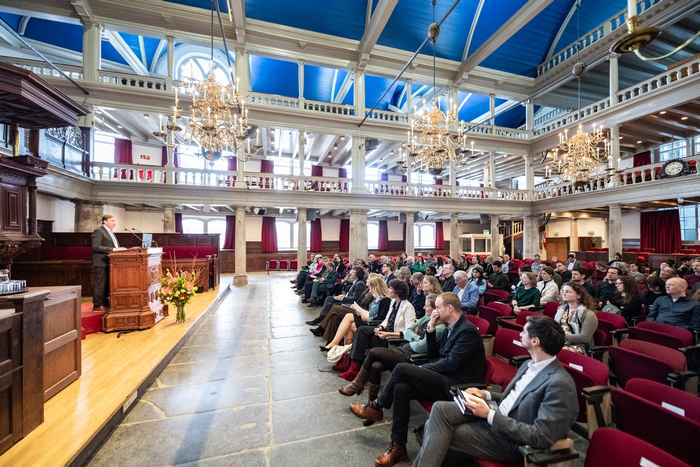
ASCoR 25 years: Celebrating successes, looking ahead, and fighting disinformation together
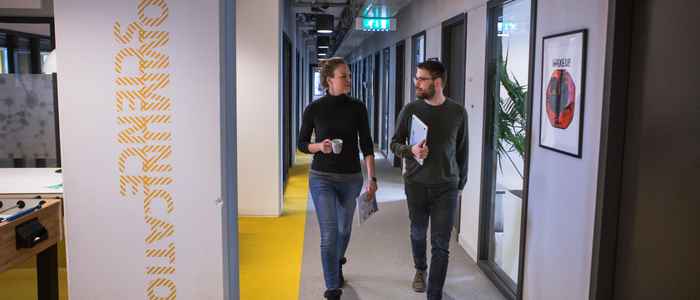
Experts in Communication Science
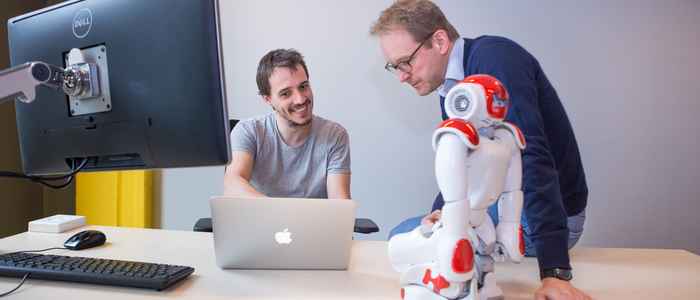
Research in Communication Science
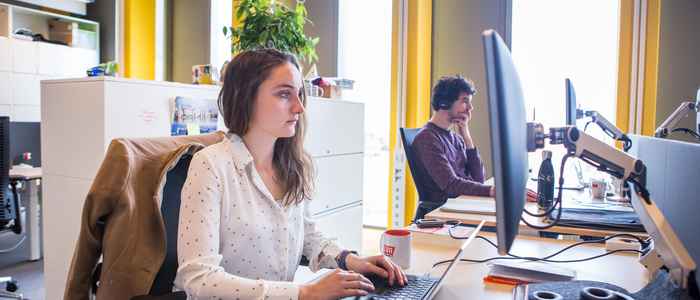
PhD programme
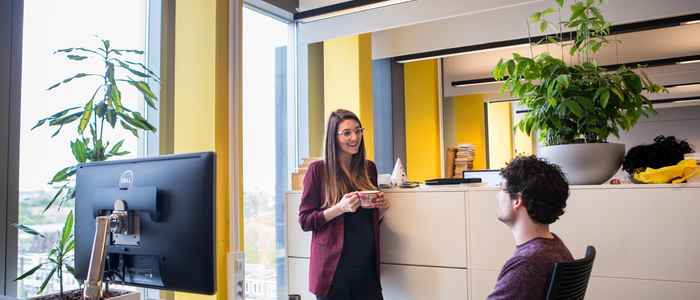
About ASCoR

Cookie Consent
The UvA uses cookies to ensure the basic functionality of the site and for statistical and optimisation purposes. Cookies are also placed to display third-party content and for marketing purposes. Click 'Accept all cookies' to consent to the placement of all cookies, or choose 'Decline' to only accept functional and analytical cookies. Also read the UvA Privacy statement .
Institute for Logic, Language and Computation ILLC

Institute for Logic, Language and Computation
- Assistant professor in Mathematical Logic
- (New) 4 June 2024, Computational Linguistics Seminar, Tanise Ceron
- 5 June 2024, LLAMA seminar, Lutz Schröder
- 6 June 2024, Master of Logic defense, Wessel Kroon

Dr. Nick Bezhanishvili
Partnership, illc people in the media.
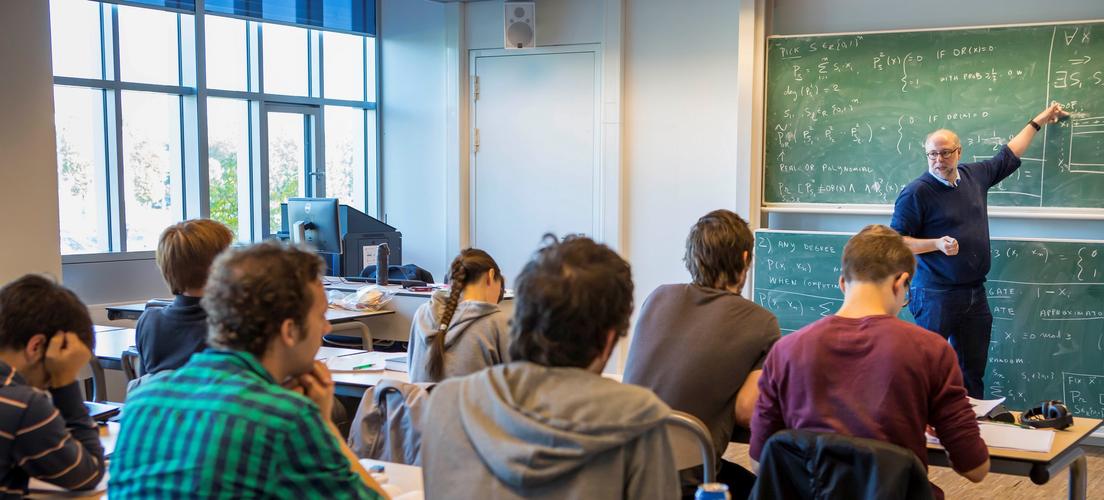
Theoretical Computer Science
In theoretical computer science, our research is characterised by a focus on fundamental questions regarding the design and analysis of algorithms. We investigate problems motivated by applications in physics, economics, and AI.
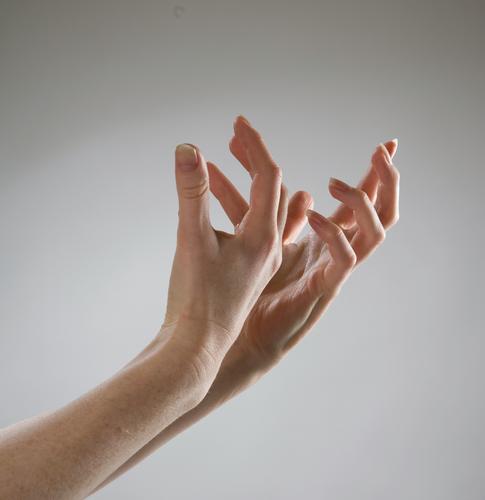
Language and Music Cognition
The Language and Music Cognition unit uses computational models and artificial intelligence to study questions of semantics and meaning, both linguistic and musical, and tests the behavioural implications of these models for speakers, signers, musicians, readers, and listeners.

Epistemology and Philosophy of Science
Researchers in this unit focus on the use of computational models and analytic methods coming from logic, probability theory and game theory to address a number of topics in formal epistemology and in the methodology and philosophy of science broadly conceived.

Formal Semantics and Philosophical Logic
The research focus of this unit is the study, through the application of formal tools, of information transfer and communication through meaningful language use, as well as of key philosophical problems. The unit brings together researchers who are a leading force within formal semantics and pragmatics and within philosophical logic.
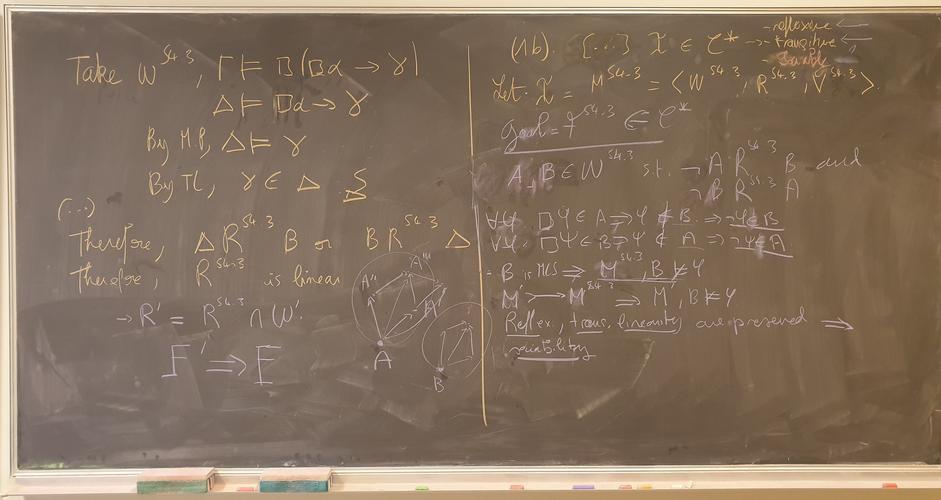
Mathematical and Computational Logic
The unit focuses on gaining a deeper understanding of the nature of information and the processes of reasoning and computation. While being best known for our work in intuitionistic and modal logic, we cover most of the classical areas of mathematical logic such as set theory, computability theory, category theory, proof theory and algebraic logic.

Natural Language Processing and Digital Humanities
Research in the Natural Language Processing and Digital Humanities unit focuses on automated analysis, interpretation and generation of human language and their extension towards language technology. Our work encompasses a range of topics within natural language processing (NLP), such as syntactic parsing, computational semantics and pragmatics, discourse processing, dialogue modelling, machine translation and multilingual NLP.
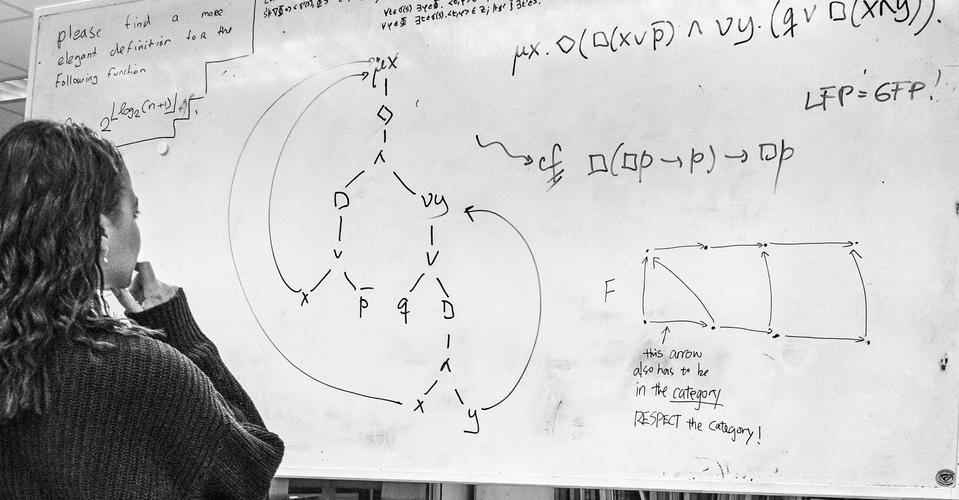
Master of Logic
The MSc in Logic is an international and interdisciplinary Master's degree offered by the University of Amsterdam. It is organized as part of the Graduate Programme in Logic (GPiL) by the Institute for Logic, Language and Computation (ILLC). The Graduate Programme offers courses and research training in foundations of mathematical and philosophical logic, and their applications in computer science, linguistics, and cognitive science.
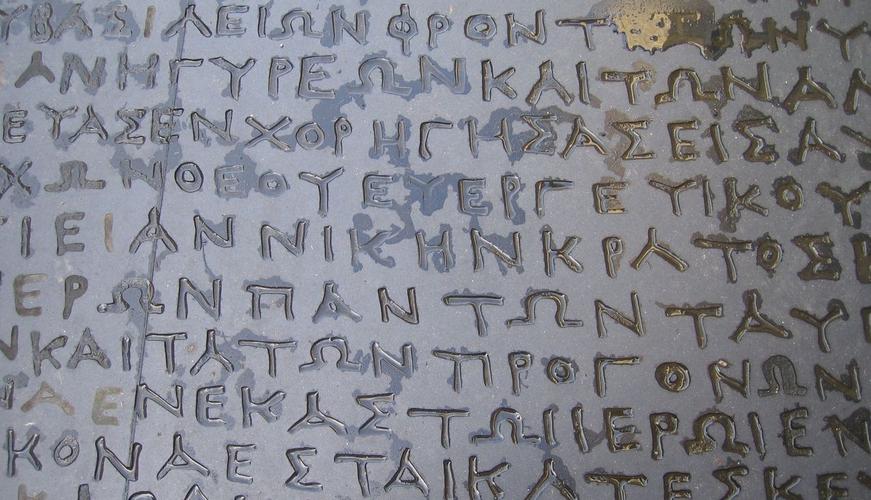

PhD Programme
The ILLC PhD programme, organised by the Institute for Logic, Language and Computation (ILLC) at the University of Amsterdam, is a four-year programme designed to support and guide PhD candidates in their track to become highly qualified scientific researchers in the areas described by the institute's research mission. PhD candidates are given the opportunity to benefit from a rich scientific programme as well as a tailor-made transferable-skills programme.
Practical matters for ILLC members
Illc room / equipment reservations.
PhD Programme / ILLC

PhD Programme
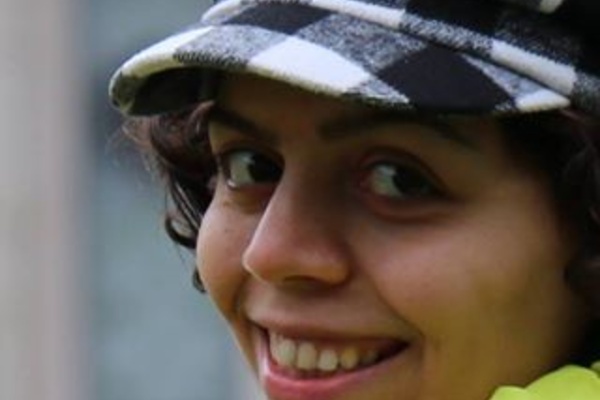
Samira Abnar PhD candidate at FNWI 2016 - 2023
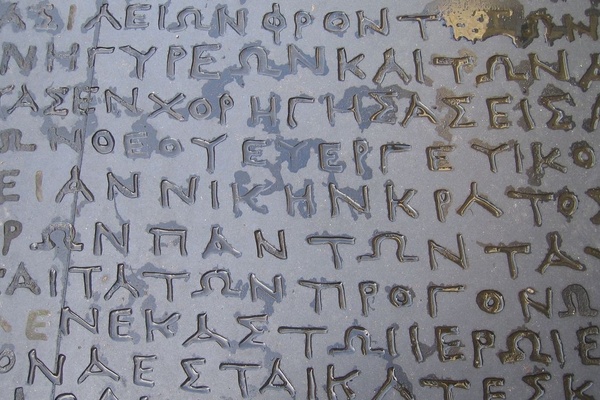
The ILLC PhD programme, organised by the Institute for Logic, Language and Computation (ILLC) at the University of Amsterdam, is a four-year programme designed to support and guide PhD candidates in their track to become highly qualified scientific researchers in the areas described by the institute's research mission. PhD candidates are given the opportunity to benefit from a rich scientific programme as well as a tailor-made transferable-skills programme.
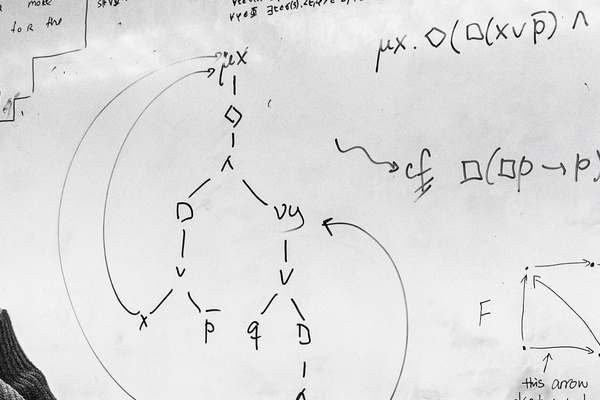
Info for Current PhD's

Doctoral school
The phases of a phd trajectory, search in all subjects.

The Amsterdam UMC Doctoral School supports PhD Candidates and their supervisors by information provision, administration, advice and education.

Our course program helps PhD candidates in conducting independent, original and scientifically significant research, and critically evaluating their own work and that of others.

Join the renowned five-day programme of BioBusiness Summer School from 24-28 June 2024 in Amsterdam and give your career in Life Sciences industry a jumpstart!
IXA organises a series of workshops, trainings and programms on various topics around valorisation and entrepreneurship, like protecting inventions, collaborating with external partners and sharing research knowledge with outside parties.
Would you like to know more about your rights as a PhD Candidate at VU Amsterdam? Join the II Edition of the Know Your Rights workshop of the VU PhD Council!
“No more PDF file, hidden on the research website”. The renewed Amsterdam UMC Research Code is now webbased, and replaces the old PDF version. The code is fully updated and aligned with the harmonization of Amsterdam UMC.
Peer to peer group coaching (in Dutch, intervisie) is experience driven. The content of the meetings is determined by the participating PhD candidates themselves and therefore has relevance for daily practice and needs of PhD candidates.

ASAP is the Association of Amsterdam UMC PhD candidates. Founded in 2021, ASAP strives to offer a professional and social network for PhD candidates at Amsterdam UMC and its affiliated centers.

A collection of links to websites that may be of interest for PhD candidates.
Get in contact with the Doctoral School
Do you have questions, comments or are you interested to receive the newsletter?
Magnet.me - The smart network where hbo and wo students find their internship and first job.
The smart network where hbo and wo students find their internship and first job.
PhD Position in Mathematics
Your career starts on Magnet.me
Create a profile and receive smart job recommendations based on your liked jobs.
Are you passionate about doing research in mathematics? The Korteweg-de Vries Institute for Mathematics is looking for an ambitious PhD candidate in mathematics. Your research is part of the Algebra, Geometry and mathematical physics group. You will be joining the project from classical to noncommutative symmetries. The goal of this project to study two mathematical incarnations of symmetry: one in the world of classical geometry where we talk about symmetries of geometric structures, and one in the world of non-commutative geometry (the quantum world in which we end up after quantisation of classical geometry). In particular, the objective is to relate these two notions of symmetry to obtain a deeper understanding of how these two worlds are related. For more information about this research project, please contact Dr. Hessel Posthuma([email protected]).
What are you going to do?
- Conduct research within (or related to) the research areas as outlined;
- Disseminate your research findings through publication in academic journals and participation in academic conferences;
- Participate in the Faculty of Science PhD training programme;
- Assist in teaching undergraduates and Master students;
- Participate in relevant seminars and engage with research collaborations locally and/or internationally;
- Complete and defend a PhD thesis within the official appointment duration of four years.
What do you have to offer?
- Master degree in Mathematics or related field;
- Affinity with any of the involved research fields mentioned in the project description;
- Highly motivated;
- Fluent in English, both written and spoken;
- Experience in teaching is a plus.
A temporary contract for 38 hours per week for the duration of 4 years (the initial contract will be for a period of 18 months and after satisfactory evaluation it will be extended for a total duration of 4 years). The preferred starting date is September 1, 2024. This should lead to a dissertation (PhD thesis). We will draft an educational plan that includes attendance of courses and (international) meetings. We also expect you to assist in teaching undergraduates and master students.
The salary, will be € 2,770 in the first year and increase to € 3,539 in the last year (scale P) gross per month, based on a fulltime contract (38 hours a week). This is exclusive 8% holiday allowance and 8.3% end-of-year bonus. A favourable tax agreement, the ‘30% ruling’, may apply to non-Dutch applicants. The Collective Labour Agreement of Dutch Universities is applicable.
Besides the salary and a vibrant and challenging environment at Science Park we offer you multiple fringe benefits:
- 232 holiday hours per year (based on fulltime) and extra holidays between Christmas and 1 January;
- multiple courses to follow from our Teaching and Learning Centre;
- a complete educational program for PhD students;
- multiple courses on topics such as time management, handling stress and an online learning platform with 100+ different courses;
- 7 weeks birth leave (partner leave) with 100% salary;
- partly paid parental leave;
- the possibility to set up a workplace at home;
- a pension at ABP for which UvA pays two third part of the contribution;
- the possibility to follow courses to learn Dutch;
- help with housing for a studio or small apartment when you’re moving from abroad.
The University of Amsterdam is one of the largest comprehensive universities in Europe. With some 40,000 students, 6,000 staff, 3,000 PhD candidates, and an annual budget of more than 850 million euros, it is also one of Amsterdam’s biggest employers. Deze bedrijfspagina is automatisch gegenereerd en bevat daarom nog weinig informatie. Je vindt meer informatie over ‘bedrijfsnaam’ op hun website: ‘’Carrierewebsite’’
People also viewed
Positions Voices of Resistance
KNAW (Nederlandse Akademie van Wetenschappen)
Amsterdam, NL
PhD gezondheidsrisico’s van extreme temperaturen
De Rijksoverheid
Bilthoven, NL
PhD position Fiscal federalism and partial fiscal decentralization
University of Groningen
Groningen, NL
PhD : Apocalypticism in Contemporary Indigenous Literatures
Radboud Universiteit
Nijmegen, NL
PhD position MetaHealth
Vrije Universiteit Amsterdam
PhD position in Neurobiology
Universitair Medisch Centrum Groningen
PhD Position - Artificial Intelligence: Power Asymmetries and Data Justice
University of Amsterdam
PhD Position Validating Automatically Generated Code
Delft University of Technology
PhD: Reconceptualising Solidarity for Technologically Disrupted Contexts
Utrecht University
Utrecht, NL
View what's on offer:
- Traineeships
- HBO Traineeships
- WO Traineeships
- Internships
- HBO Internships
- WO Internships
- Graduate internships
- Business courses
- Inhouse days
- All locations
Quickly browse to:
- Communication internships
- IT internships
- Marketing internships
- Consulting internships
- IT traineeships
- Consulting traineeships
- Internship interview - A complete guide
- How to choose a company to work for after graduating
- 9 things to know before starting an internship
- How to rock your video interview
- Skills for CV: Teamwork
- 4 tips that guarantee you to ace your first job interview in the Netherlands
- Careers guide
- About us (press)
- For employers
- Privacy Policy & Terms of Service
- Careers at Magnet.me
Change language to: Dutch
This page is optimised for people from the Netherlands. View the version optimised for people from the UK.
Reimagining a Theoretical Turn in Fashion Scholarship roundtable and Special Issue launch

Amsterdam launch for the International Journal of Fashion Studies Special Issue, "B(l)ending Research Methods: Reimagining a Theoretical Turn in Fashion Scholarship,” co-edited by Tommy Tse, Diego Semerene, and Sophie Kurkdjian.
The event will take the shape of a roundtable with Tommy Tse, Vésma Kontere McQuillan, Marie-Aude Baronian, Misha Kavka, Christine Delhaye and Diego Semerene. We will take up questions stemming from the following contributions to the Special Issue:
“Fashion as a cultural analysis object,” Marie-Aude Baronian
“Skimming fashion, or how to read skin-deep,” Misha Kavka
“The trans gender subject of fashion,” Diego Semerene
“Rethinking fashion review with architectural fashion analysis method,” Vésma Kontere McQuillan
“Against abstract universalisms in fashion theory: For a dialogical process of interpretation and translation,” Christine Delhaye
The Introduction to the issue is available online: https://intellectdiscover.com/content/journals/10.1386/infs_00106_2
[in person only, no streaming/recording].

Room OMHP room C 2.17 Oudemanhuispoort 4-6 1012 CN Amsterdam
Cookie Consent
The UvA uses cookies to ensure the basic functionality of the site and for statistical and optimisation purposes. Cookies are also placed to display third-party content and for marketing purposes. Click 'Accept all cookies' to consent to the placement of all cookies, or choose 'Decline' to only accept functional and analytical cookies. Also read the UvA Privacy statement .
- Departments
- Program Finder
- Admissions Services
- Course Directory
- Academic Calendar
- Hybrid Campus
- Lecture Series
- Convocation
- Strategy and Development
- Implementation and Impact
- Integrity and Oversight
- In the School
- In the Field
- In Baltimore
- Resources for Practitioners
- Articles & News Releases
- In The News
- Statements & Announcements
- At a Glance
- Student Life
- Strategic Priorities
- Inclusion, Diversity, Anti-Racism, and Equity (IDARE)
- What is Public Health?
Nearly One-Third of U.S. Adults Know Someone Who’s Died of Drug Overdose
Survey also finds ‘overdose loss’ bolsters recognition of addiction as an important policy issue that spans party lines
Losing a loved one to drug overdose has been a common experience for many Americans in recent years, crossing political and socioeconomic divides and boosting the perceived importance of the overdose crisis as a policy issue, according to a new survey led by researchers at the Johns Hopkins Bloomberg School of Public Health.
A nationally representative survey of more than 2,300 Americans, fielded in spring 2023, suggests that 32 percent of the U.S. adult population, or an estimated 82.7 million individuals, has lost someone they know to a fatal drug overdose. For nearly one-fifth of survey respondents—18.9 percent, representing an estimated 48.9 million adults—the person they knew who died of overdose was a family member or close friend.
The rates of reported loss due to overdose did not differ significantly by political party affiliation, but those who experienced overdose loss were more likely to view addiction as an extremely or very important policy issue.
The study was published online May 31 in JAMA Health Forum .
“The drug overdose crisis is a national tragedy,” says Alene Kennedy-Hendricks, PhD, assistant professor in the Department of Health Policy and Management at the Bloomberg School, who led the analysis. “Although large numbers of U.S. adults are bereaved due to overdose, they may not be as visible as other groups who have lost loved ones to less stigmatized health issues. Movements to build support for policy change to overcome the devastating toll of the overdose crisis should consider the role of this community.”
Over one million Americans have died from drug overdoses since the late 1990s, including more than 100,000 per year in the last few years, according to the Centers for Disease Control and Prevention. Last year, overdose deaths declined slightly for the first time in five years, decreasing three percent from 2022, according to preliminary data from the CDC’s National Center for Health Statistics. At about 108,000 estimated deaths, the CDC 2023 preliminary numbers remain near historic highs.
The overdose crisis has evolved over several phases, beginning with prescription opioids such as oxycodone playing a key role, followed by heroin and, more recently, powerful synthetic opioids like illicitly manufactured fentanyl and polysubstance use. Opioids can suppress breathing as a side effect, and the unpredictability of the illicit drug supply and the potency of fentanyl have dramatically increased the risk of overdose.
While the survey questions did not specifically identify opioids, the majority of overdose deaths over the last two decades have been opioid-related.
The overdose crisis has not only impacted its direct victims but also their relatives, friends, and acquaintances. Kennedy-Hendricks and her colleagues at the Bloomberg School’s Center for Mental Health and Addiction Policy set up the study to help illuminate this wider impact, which otherwise has been little studied.
The paper was co-written with colleagues from Boston University School of Public Health, the University of Minnesota, and the de Beaumont Foundation. The study’s senior author is Sandro Galea, MD, DrPH, MPH, dean of Boston University School of Public Health.
The survey is part of the CLIMB (COVID-19 and Life Stressors Impact on Mental Health and Well-being) study. Led by Catherine Ettman, PhD, an assistant professor in the Bloomberg School’s Department of Health Policy and Management, the CLIMB study has surveyed a nationally representative sample of adult Americans annually since 2020. For this overdose loss study, questions to participants from March 28 to April 17, 2023—CLIMB Wave 4—included “Do you personally know anyone who has died from a drug overdose?” A total of 2,326 participants responded to the question. Participants answering “yes” were then asked “Who do you know that has died from a drug overdose?”
Overdose losses were reported across all income groups. Forty percent of lower-income respondents (defined as annual household incomes less than $30,000) reported overdose loss. Over one-quarter—26 percent—of respondents in the $100,000 and higher annual household income category reported an overdose loss.
The rate of reported overdose loss was not significantly different across self-described Republicans, Democrats, and Independents, adding to the picture of a far-reaching phenomenon.
The data suggested a high level of endorsement across all groups—greater than 60 percent, even among those reporting no overdose loss—that addiction is an extremely or very important policy issue. Respondents who reported overdose loss had 37 percent greater odds of viewing addiction as a very or extremely important policy priority.
“This study contributes new evidence that the addiction crisis and the losses that come with it are common across Americans, but the burden is greater among those who are more economically precarious,” says Ettman. “Addressing addiction can be a unifying theme in increasingly divided times.”
The researchers plan to follow up with further studies in future CLIMB survey waves, looking at associations between overdose loss and other social variables such as trust in institutions.
“ Experience of Personal Loss Due to Drug Overdose Among U.S. Adults ” was co-authored by Alene Kennedy-Hendricks, Catherine Ettman, Sarah Gollust, Sachini Bandara, Salma Abdalla, Brian Castrucci, and Sandro Galea.
CLIMB Study Wave 4 was funded by a grant from the de Beaumont Foundation.
Media contacts: Kate Sam [email protected] or Kris Henry [email protected]
Related Content
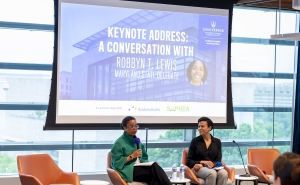
Health in All Policies

A Brief History of Traffic Deaths in the U.S.

The Hunger Gap

Rewriting the Story of Life’s Later Years

Amsterdam’s Struggle to Improve Sex Worker Health
The thinnest lens on Earth, enabled by excitons
29 May 2024
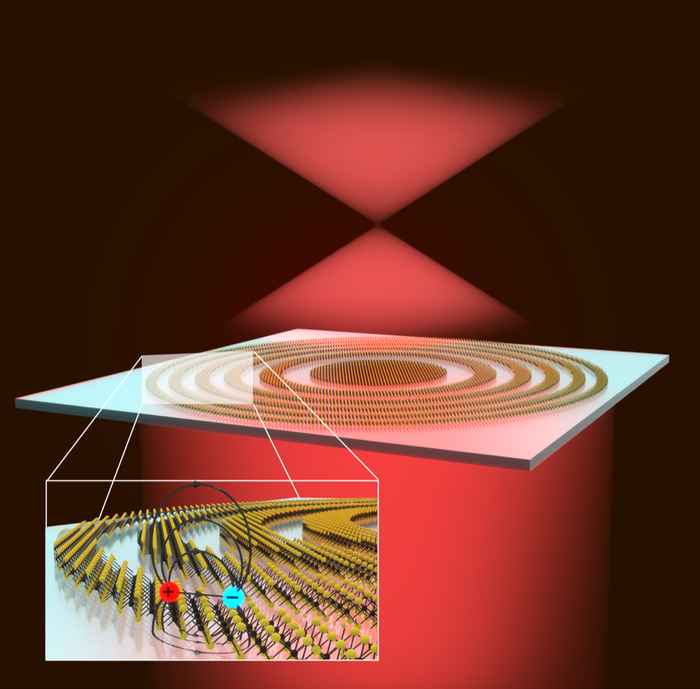
When you imagine a lens, you probably picture a piece of curved glass. This type of lens works because light is refracted (bent) when it enters the glass, and again when it exits, allowing us to make things appear larger or closer than they actually are. We have used curved lenses for more than two millennia, allowing us to study the movements of distant planets and stars, to reveal tiny microorganisms, and to improve our vision.
Ludovico Guarneri, Thomas Bauer, and Jorik van de Groep of the University of Amsterdam, together with colleagues from Stanford University in California, took a different approach. Using a single layer of a unique material called tungsten disulphide (WS 2 for short), they constructed a flat lens that is half a millimetre wide, but just 0.0000006 millimetres, or 0.6 nanometres, thick. This makes it the thinnest lens on Earth!
Rather than relying on a curved shape, the lens is made of concentric rings of WS 2 with gaps in between. This is called a ‘Fresnel lens’ or ‘zone plate lens’, and it focuses light using diffraction rather than refraction. The size of, and distance between the rings (compared to the wavelength of the light hitting it) determines the lens’s focal length. The design used here focuses red light 1 mm from the lens.
Quantum enhancement
A unique feature of this lens is that its focussing efficiency relies on quantum effects within WS 2 . These effects allow the material to efficiently absorb and re-emit light at specific wavelengths, giving the lens the built-in ability to work better for these wavelengths.
This quantum enhancement works as follows. First, WS 2 absorbs light by sending an electron to a higher energy level. Due to the ultra-thin structure of the material, the negatively charged electron and the positively charged ‘hole’ it leaves behind in the atomic lattice stay bound together by the electrostatic attraction between them, forming what is known as an ‘exciton’. These excitons quickly disappear again by the electron and hole merging together and sending out light. This re-emitted light contributes to the lens’s efficiency.
The scientists detected a clear peak in lens efficiency for the specific wavelengths of light sent out by the excitons. While the effect is already observed at room temperature, the lenses are even more efficient when cooled down. This is because excitons do their work better at lower temperatures.
Augmented reality
Another one of the lens’s unique features is that, while some of the light passing through it makes a bright focal point, most light passes through unaffected. While this may sound like a disadvantage, it actually opens new doors for use in technology of the future. “The lens can be used in applications where the view through the lens should not be disturbed, but a small part of the light can be tapped to collect information. This makes it perfect for wearable glasses such as for augmented reality,” explains Jorik van de Groep, one of the authors of the paper.
The researchers are now setting their sights on designing and testing more complex and multifunctional optical coatings whose function (such as focussing light) can be adjusted electrically. “Excitons are very sensitive to the charge density in the material, and therefore we can change the refractive index of the material by applying a voltage,” says Van de Groep. The future of excitonic materials is bright!
Publication
Ludovica Guarneri, Qitong Li, Thomas Bauer, Jung-Hwan Song, Ashley P. Saunders, Fang Liu, Mark L. Brongersma and Jorik van de Groep, Temperature-Dependent Excitonic Light Manipulation with Atomically Thin Optical Elements . Nano Letters 24, 21, 6240-6246 (2024)
Cookie Consent
The UvA uses cookies to ensure the basic functionality of the site and for statistical and optimisation purposes. Cookies are also placed to display third-party content and for marketing purposes. Click 'Accept all cookies' to consent to the placement of all cookies, or choose 'Decline' to only accept functional and analytical cookies. Also read the UvA Privacy statement .

She earned her first college degree at 10. Now, this Chicago teen has a Ph.D.
C HICAGO — Dorothy Jean Tillman II had always dreamed of her prom dress: royal blue, with a sweetheart neckline and a fitted bodice.
“She’s such a teenager,” her mom, Jimalita Tillman said.
But unlike other teens, Dorothy isn’t in high school — far from it. Earlier this month, the 18-year-old graduated with a Ph.D. in integrated behavioral health from Arizona State University. Her friends call her DJ, short for Dorothy “Jeanius.”
“I’m just grateful that I was able to make it this far,” Dorothy said. “I have a very supportive team of people around me, so I feel very lucky.”
The Bronzeville teen is the youngest person ever to graduate from ASU’s behavioral health doctoral program. The median age of doctorate recipients in the U.S. is 31.4. It’s extremely rare for teens to earn a Ph.D.: Just 0.6% of 18- and 19-year-olds have a bachelor’s degree, according to the National Center for Education Statistics.
Now, Dorothy has dedicated her time to nonprofit work, tackling education inequality on the city’s South Side.
Jimalita — her self-proclaimed “momCEO” — said her only child excelled in advanced coursework from a young age. As a child, she was homeschooled, insulated in a tight-knit circle of tutors and coaches. At age 10, she began online classes at the College of Lake County as a psychology major.
Traditional schooling seemed too constricting for the prodigy, her mom said.
“You can’t put a 10-year-old in a box,” Jimalita said. “She was very curious. A lot of adults have not historically been able to deal with someone so young as a critical thinker.”
While her peers were in elementary school, Dorothy earned a bachelor of science in humanities at Excelsior University. At age 14, she completed a double master’s from Unity Environmental University in environmental and sustainable science. The rigorous and remote schoolwork wasn’t always easy.
“I try to give myself a big push with everything I do,” she said. “Sometimes that can be a little anxiety-invoking.”
A trailblazing legacy runs in the family. Her grandmother and her namesake, Dorothy Jean Tillman I, was a Chicago alderman for more than two decades on the South Side. Known for her extravagant hats, she worked as a field staff organizer beside Martin Luther King Jr. and was a fierce advocate for slavery reparations in the city.
“I carry her legacy with me,” Dorothy said of her grandmother. “I think that seeing all the work that she did as a community leader definitely inspired me to want to do something similar.”
At first, Dorothy was nervous about pursuing a doctorate, but she found herself drawn to ASU’s online behavioral health program. A Ph.D. seemed like the natural next step in her education journey, she said. She also loved the university’s “merch,” she recalled fondly.
“We went and spent, like, $800 at their store, and I was like, ‘I think I’ll stay.’ I like this shirt,” she said with a laugh.
Her dissertation, which she successfully defended at age 17, analyzed stigmas associated with campus mental health services. Lesley Manson, an ASU professor and chair of Tillman’s doctoral committee, described the teen as dedicated and hardworking. Her age only propelled her further.
“She tackled challenges head-on, never allowing her age to limit her aspirations,” Manson said in an email. “Her passion for equity and advocacy was clear.”
Dorothy hopes to use her degrees to improve the accessibility of STEAM education in Chicago (short for science, technology, engineering, art and math). She launched two nonprofit organizations in 2020: Dorothyjeanius STEAM Leadership Institute and Dorothy Jeanius STEAM Labs, with locations in Chicago and South Africa.
Her institute’s free summer program in Bronzeville offers field trips, labs and classes to 30 students. This year, the waitlist is more than 200 families long. Now that she’s graduated, she hopes to run the program year-round.
The teen also serves as an official adviser on STEAM education for the Ghana government and has co-authored a children’s book encouraging young adults to unlock their potential.
Nearly 5,000 students have participated in activities through her nonprofit. Many say she’s a source of inspiration.
“Even though Dorothy is technically the boss and CEO, she doesn’t just make decisions, she wants to hear feedback from everyone,” said Aryn Delette, a 20-year-old camp counselor and nursing student. “Watching her, it really does allow you to look at yourself as a leader.”
JP Paulus’ 12-year-old daughter attended the camp last summer. It wasn’t until Dorothy appeared on “The Jennifer Hudson Show” last month that the pair realized the extent of her accomplishments. Paulus was struck by how down-to-earth she was.
“She’s very smart, a doctor, but at the same time she’s able to still relate to kids and interact as a normal teenager,” said Paulus, a Bronzeville resident.
Dorothy tries to carve out a sense of normalcy for herself through creative outlets. She’s a member of a youth dance group, the Happiness Club, and frequently performs at the Harold Washington Cultural Center, where her mom works as the global director. She’s been commissioned for paintings and writes plays.
“When I hear music, I can’t help but dance,” Dorothy said. “When I feel feelings, I can’t help but want to write poetry. When I see something hilarious, I can’t help but want to put it in a play.”
Sometimes, she said she wonders if she missed out on aspects of her childhood. Her circle of friends is a mismatched puzzle, she said, a network of people she’s met through extracurricular activities and other homeschooling students. But she doesn’t like to dwell on the past.
“Comparison is a thief of joy,” Dorothy said. “And the grass isn’t really greener on the other side, it’s greener where you water it. I use a lot of metaphors, but when you really picture them, they definitely make you more comfortable in an array of situations. That’s how I looked to the future.”
And the future has been bright. Ahead of her graduation in February, her mom surprised her with a trip to Tokyo for Taylor Swift’s “Eras Tour.” In March, she went on a graduation trip to Amsterdam with friends.
“We’ve had so much fun,” Jimalita said. “We’re just trying to celebrate.”
Now, Dorothy hopes to take time off before leading her institute’s summer camp. As for another degree? She won’t rule it out.
“In the past, I’ve gotten degrees and then been like, ‘OK, what’s next?” she said. “And the answer to my question now is just exploring the world and the things it has to offer.”
This month, with a friend, she was finally able to attend a high school prom.
©2024 Chicago Tribune. Visit at chicagotribune.com. Distributed by Tribune Content Agency, LLC.

What does a doctorate involve?
As a PhD candidate, you will make an original contribution to science and scholarship. A doctoral programme usually lasts four years (full-time) but in some cases, a programme may be shorter or longer. Some doctoral programmes take just three years full-time, while for some external PhD candidates, who carry out their doctoral research alongside or after their work, it may take more than four years.
Original and independent research
During the doctoral programme, the emphasis lies on performing original, independent research with the help of a supervisor and a co-supervisor. As a PhD candidate you may also have teaching responsibilities, you will take specialised and more general courses and you will attend conferences. The aim of obtaining a doctorate is to acquire the skills you need to carry out independent academic research.
Doctoral thesis
At the end of your doctoral programme, you will present your results in a doctoral thesis (dissertation). Once your supervisors have approved your thesis, it will be submitted to a Doctorate Committee for assessment. If the assessment is positive, you will be asked to defend your doctoral thesis before this Committee. The successful defence of a doctoral thesis results in a doctorate (PhD degree).
Cookie Consent
The UvA uses cookies to ensure the basic functionality of the site and for statistical and optimisation purposes. Cookies are also placed to display third-party content and for marketing purposes. Click 'Accept all cookies' to consent to the placement of all cookies, or choose 'Decline' to only accept functional and analytical cookies. Also read the UvA Privacy statement .

IMAGES
VIDEO
COMMENTS
PhD research. PhD research is at the heart of what we do as a University. Around 2000 PhD candidates are involved in research and education at the UvA and around 400 doctorates are conferred each year. Two-thirds of these are in the Sciences or Medicine.
At Vrije Universiteit Amsterdam we provide three or four year research intensive PhD programs, or part time PhD programs with a duration above four years, organized in graduate schools of nine VU Amsterdam faculties. We expect our doctoral graduates to become internationally engaged scientists with transferable skills and opportunities to plan ...
The Amsterdam Business School aims to conduct and high-quality international research and offers teaching that meets international standards at a high-level. We regularly offer PhD positions for outstanding candidates who want to pursue an academic career in the inspiring and challenging academic environment of our school and who are willing to ...
Amsterdam School of Economics. Faculty & Research. PhD research. Every year, around 500 doctoral degrees (PhDs) are conferred at the University of Amsterdam (UvA). Currently about 60 PhD students are working on their research at the Amsterdam School of Economics. Topics vary from financial econometrics to entrepreneurship and innovation.
PhD candidates who are not employed by the University of Amsterdam but receive a scholarship, pay a fee of €4.545 up to €15.000 annually (depending on the specific situation). This fee covers a variety of costs such as the selection procedure, supervision, PhD training (core courses, seminars) and a small research budget.
The Amsterdam Business Research Institute offers a part-time PhD programme for management practitioners. This programme supports executives and management professionals with a relevant background in conducting PhD-level research, and facilitates them in matching their professional experience with excellent academic insights.
Celebrating 25 years of ASCoR with groundbreaking research in communication science. Discover our anniversary event and participation in the Mis/Disinformation Initiative preview! ASCoR (University of Amsterdam) is Europe's largest research institute studying the communication and media landscape and boasts 25 PhD positions.
The ILLC PhD programme, organised by the Institute for Logic, Language and Computation (ILLC) at the University of Amsterdam, is a four-year programme designed to support and guide PhD candidates in their track to become highly qualified scientific researchers in the areas described by the institute's research mission. PhD candidates are given ...
Admission. Doctoral research can only take place under the supervision of a professor associated with the UvA (Doctorate Regulations 2020). You cannot take your application further until a professor has agreed to take you on as a PhD candidate. On commencement of your doctoral programme you must submit a request for admission to the doctoral ...
The ILLC PhD programme, organised by the Institute for Logic, Language and Computation (ILLC) at the University of Amsterdam, is a four-year programme designed to support and guide PhD candidates in their track to become highly qualified scientific researchers in the areas described by the institute's research mission. PhD candidates are given ...
ASAP (Association of Amsterdam UMC PhD Candidates) is the association for PhD students of the Amsterdam UMC, founded in February 2021. ASAP strives to offer a professional and social network for PhD candidates at Amsterdam UMC and its affiliated centers. The UvA Doctorate regulations describe the requirements to conduct your PhD research and ...
In 2025, five Amsterdam UMC PhD Scholarships will be awarded to excellent students in (and limited to) Medicine, Medical Informatics, Biomedical Sciences or Social Sciences. Submit your nomination as from 1 September to 15 December 23.59 (these dates are not yet final) The Amsterdam PhD scholarships are financed from core government funding.
The Amsterdam UMC Doctoral School supports PhD Candidates and their supervisors by information provision, administration, advice and education. Our course program helps PhD candidates in conducting independent, original and scientifically significant research, and critically evaluating their own work and that of others.
Vrije Universiteit Amsterdam ('VU Amsterdam') is an internationally renowned research university founded in 1880. The university offers over 190 English-taught programmes at Bachelor's, Master's and PhD level to more than 24,000 students from all over the world.
PhD. AIGHD also plays a crucial role in mentoring PhD students from academic institutions students at the University of Amsterdam and the Vrije Universiteit Amsterdam, often in collaboration with academic and research institutions around the world including the Amsterdam UMC, ISGlobal (Barcelona Spain), the Institute for Tropical Medicine ...
The University of Amsterdam is one of the largest comprehensive universities in Europe. With some 40,000 students, 6,000 staff, 3,000 PhD candidates, and an annual budget of more than 850 million euros, it is also one of Amsterdam's biggest employers. Deze bedrijfspagina is automatisch gegenereerd en bevat daarom nog weinig informatie.
Amsterdam launch for the International Journal of Fashion Studies Special Issue, "B(l)ending Research Methods: Reimagining a Theoretical Turn in Fashion Scholarship," co-edited by Tommy Tse, Diego Semerene, and Sophie Kurkdjian.. The event will take the shape of a roundtable with Tommy Tse, Vésma Kontere McQuillan, Marie-Aude Baronian, Misha Kavka, Christine Delhaye and Diego Semerene.
The survey is part of the CLIMB (COVID-19 and Life Stressors Impact on Mental Health and Well-being) study. Led by Catherine Ettman, PhD, an assistant professor in the Bloomberg School's Department of Health Policy and Management, the CLIMB study has surveyed a nationally representative sample of adult Americans annually since 2020.
Ludovico Guarneri, Thomas Bauer, and Jorik van de Groep of the University of Amsterdam, together with colleagues from Stanford University in California, took a different approach. Using a single layer of a unique material called tungsten disulphide (WS 2 for short), they constructed a flat lens that is half a millimetre wide, but just 0.0000006 ...
Obtaining a PhD without an employment contract. It is also possible to obtain a doctorate without being employed by the UvA. Contract PhD candidates are those who have concluded an agreement with the UvA or a third party with a view to obtaining a doctorate. They may be funded by, or given time to pursue their studies by, an employer.
She earned her first college degree at 10. Now, this Chicago teen has a Ph.D. Jimalita Tillman, left, and her daughter Dorothy Jean Tillman, 18, at their home in Chicago on May 17, 2024. Tillman ...
During the doctoral programme, the emphasis lies on performing original, independent research with the help of a supervisor and a co-supervisor. As a PhD candidate you may also have teaching responsibilities, you will take specialised and more general courses and you will attend conferences. The aim of obtaining a doctorate is to acquire the ...